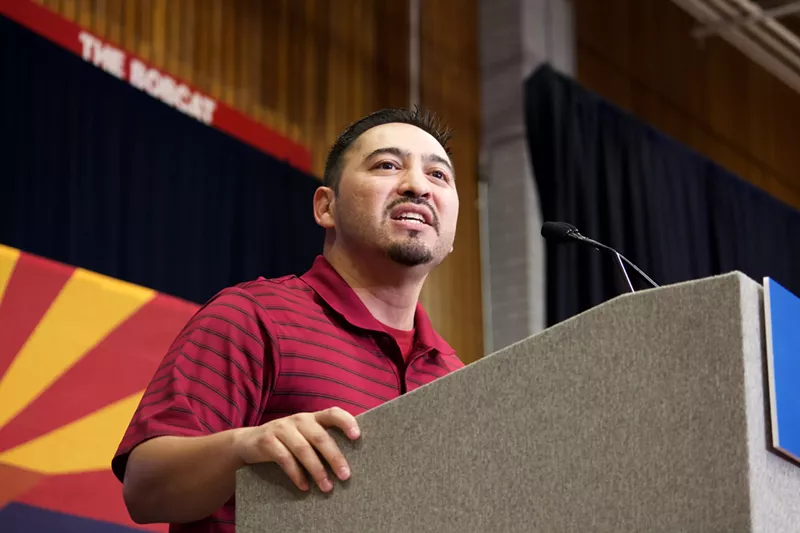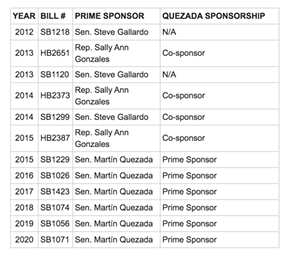A Democratic legislator has introduced a bill that would repeal what remains of the infamous Senate Bill 1070, Arizona’s well-known immigration law that was signed into law a decade ago.
Almost every year since it passed in 2010, an effort's emerged to remove it. This marks the 12th attempt — though none of the past proposals have ever reached a hearing in the Legislature.
SB 1070, which allowed law enforcement to ask for the papers of people suspected of being in the country illegally, was in large part declared unconstitutional in 2012, but remains on the books within the state.
On Tuesday, State Senator Martin Quezada introduced a proposal that would remove the controversial bill entirely – a move that he believes is both symbolic and holds tangible ramifications for Latino residents of Arizona.
“Obviously the originally SB 1070, which passed in 2010, was a pretty anti-immigrant bill,” Quezada said. “Although a lot of the parts of it were struck down by the Supreme Court because they were unconstitutional, there’s never been any efforts to remove them from our laws and erase the black mark that it was from our history.“
Quezada has introduced a bill to repeal the immigration law in the Senate every year since 2015 – this year marks his seventh attempt as the primary sponsor. Naturally, the bill will meet opposition from more conservative members of the Legislature, who continue to tout the necessity of SB 1070 and previously have opposed such a measure.
Former Arizona Governor Jan Brewer signed SB 1070, a comprehensive series of anti-immigration measures formally titled the Support Our Law Enforcement and Safe Neighborhoods Act, in April 2010. The bill aimed to reduce the number of immigrants within the state illegally through attrition — by making life so difficult for undocumented persons that they were compelled to leave, and increasing law enforcement’s power to investigate anyone suspected of being in the country illegally.
The law centered around four provisions: It allowed police to ask for immigration papers of a person stopped for other reasons besides immigration violations, or arrest a person without a warrant if they believed they’d committed a deportable offense. It also made it a state crime for legal immigrants to fail to carry registration papers, and for people who were undocumented to solicit work.
“People were afraid to call and report crimes that were happening in their community, because they didn’t trust law enforcement,” said Quezada. “We’re still dealing with the remnants of that today, with that completely broken relationship.”
The bill drew national ire – as well as praise – prior to its gutting by the Supreme Court in 2012 and a subsequent settlement from a lawsuit filed against the state by the American Civil Liberties Union and other immigrants’ rights groups. A majority of voting Arizonans supported it at its time of passing, though 81 percent of registered Latino voters opposed the bill, according to a June 2010 Arizona State University poll. Today, many Democratic Arizonans credit opposition to SB 1070 as the genesis of their political activism.
“SB 1070 represented the pinnacle of a growing anti-immigrant and anti-Latino movement in Arizona,“ said Quezada, who himself decided to run after watching the bill pass in the gallery as a legislative assistant. “Here we are a decade later, and we’ve turned the state purple. And a lot of that is due to the message SB 1070 sent to our communities.”
The first provision of SB 1070, labeled by opponents as the "Show Me Your Papers" measure, remains in place today. If an officer begins to suspect a person they've detained or pulled over for a possible state or local crime, like a DUI, is in the country illegally, they're still required under this provision to request the person's immigration papers and contact Immigration and Customs Enforcement to verify their citizenship status.
There are exceptions – a person is presumed to be lawfully present if they present a valid driver's license, and an officer can opt not to contact ICE if they deem an investigation into a person's status "impracticable." Local law enforcement additionally cannot hold a person longer than the original purpose of the stop to verify immigration status. The Phoenix Police Department, Arizona's largest police force, declined to comment on how often they apply this remaining SB 1070 requirement.
The only deputies not subject to the existing law come from the Maricopa County Sheriff's Office – due to a court order in the ongoing Melendres v. Arpaio lawsuit, MCSO employees are forbidden to question anyone about their immigration status. MCSO policy now prohibits employees from enforcing any immigration law, according to MCSO spokesperson Sergeant Calbert Gillett, though Democratic Sheriff Paul Penzone still allows ICE to screen the immigration status of everyone who comes through the MCSO jail system.
"The heart and soul of SB 1070 was that requirement, and that was ruled perfectly constitutional," said Republican House Representative John Kavanagh, who has previously spoken out against repeal efforts. "That's why these bills to kill it come up all the time. Because they know it's an effective bill, and they want to end its effectiveness. [With a repeal of SB 1070], I think the very strong deterrent effect that SB 1070 has on illegal immigrants would also be removed. We would change from a state which is hostile to lawbreakers in this area to a welcoming one."
The new proposal, intentionally titled SB 1071, is co-sponsored by Democratic lawmakers including Senators Lela Alston, Ann Gonzales, Juan Jose Mendez, and Tony Navarrete, as well as House Representatives Raquel Terán, Athena Salman, Diego Rodriguez, and Charlene Fernandez.
Though large portions of SB 1070 have been rolled back, Quezada said he believes repealing SB 1070 will have a strong impact on the lives of immigrants and Latinos within the state – even in indirect ways.
“There are a lot of people that still don’t know what their rights are,” Quezada said. “You see that move down to simple things, like applying for free and reduced lunch at a public school. Parents are still afraid to come in and fill out those forms after Senate Bill 1070. And that’s the biggest impact I still see – immigrants are afraid to get involved in their children’s education, even if their children are citizens, because they still fear Arizona is an anti-immigrant state. And it’s all a result of laws like SB 1070 that have been passed in the state of Arizona.
“I think the bigger message is that the bill in its entirety was part of an ugly part of our history, and it’s a part that we should definitely move forward from,” Quezada said.
SB 1071 was pre-filed in the Arizona House Senate on January 7.
[
{
"name": "Air - MediumRectangle - Inline Content - Mobile Display Size",
"component": "18478561",
"insertPoint": "2",
"requiredCountToDisplay": "2"
},{
"name": "Editor Picks",
"component": "16759093",
"insertPoint": "4",
"requiredCountToDisplay": "1"
},{
"name": "Inline Links",
"component": "17980324",
"insertPoint": "8th",
"startingPoint": 8,
"requiredCountToDisplay": "7",
"maxInsertions": 25
},{
"name": "Air - MediumRectangle - Combo - Inline Content",
"component": "16759092",
"insertPoint": "8th",
"startingPoint": 8,
"requiredCountToDisplay": "7",
"maxInsertions": 25
},{
"name": "Inline Links",
"component": "17980324",
"insertPoint": "8th",
"startingPoint": 12,
"requiredCountToDisplay": "11",
"maxInsertions": 24
},{
"name": "Air - Leaderboard Tower - Combo - Inline Content",
"component": "16759094",
"insertPoint": "8th",
"startingPoint": 12,
"requiredCountToDisplay": "11",
"maxInsertions": 24
}
]












